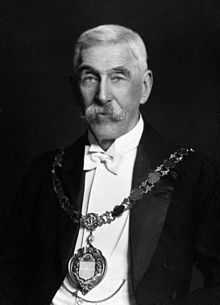Leonard Rogers
For the British mathematician, see Leonard James Rogers.
| Sir Leonard Rogers | |
|---|---|
 Sir Leonard Rogers | |
| Born |
18 January 1868 Hartley House, Helston |
| Died |
16 September 1962 Royal Cornwall Infirmary, Truro |
| Nationality | English |
| Fields | Tropical medicine |
| Known for | Founding the Royal Society of Tropical Medicine and Hygiene |
| Notable awards |
CIE (1914)[1] Fellow of the Royal Society[2] KCSI (1932)[1] Manson Medal (1938) |
| Spouse | Una Elsie North[1] |
| Children | 3 sons [1] |
Sir Leonard Rogers FRS[2] (18 January 1868 – 16 September 1962) was a founder member of the Royal Society of Tropical Medicine and Hygiene, and its President from 1933 to 1935.[1][3]
Biography
Rogers had a wide range of interests in tropical medicine, from the study of kala-azar epidemics to sea snake venoms, but is best known for pioneering the treatment of cholera with hypertonic saline, which has saved a multitude of lives.
Rogers was one of the pioneers in setting up the Calcutta School of Tropical Medicine in India.
He was president of the 1919 session of the Indian Science Congress.
Works
Digitised versions from National Library of Scotland.
- Experimental investigation of the effects of haemostatic and other drugs on the intravascular coagulability of the blood (1895).
- 3 - On the influence of variations of the ground-water level on the prevalence of malarial fevers (1895).
- Report of an investigation of the epidemic of malarial fever in Assam, or, kala-azar (1897).
- Resolution on Dr Rogers' report on Kala azar (1897).
References
- ↑ 1.0 1.1 1.2 1.3 1.4 "Rogers, Sir Leonard (1868–1962)". The Oxford Dictionary of National Biography. 2004. doi:10.1093/ref:odnb/35814.
- ↑ 2.0 2.1 Boyd, J. S. K. (1963). "Leonard Rogers 1868-1962". Biographical Memoirs of Fellows of the Royal Society 9: 261. doi:10.1098/rsbm.1963.0014.
- ↑ Sir Leonard Rogers, Happy Toil: Fifty-Five Years of Tropical Medicine (London: Frederick Muller Ltd., 1950).
|